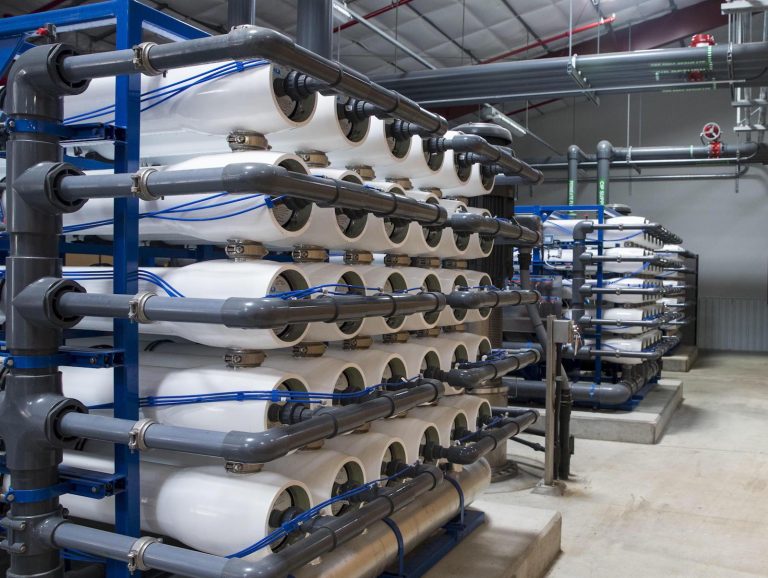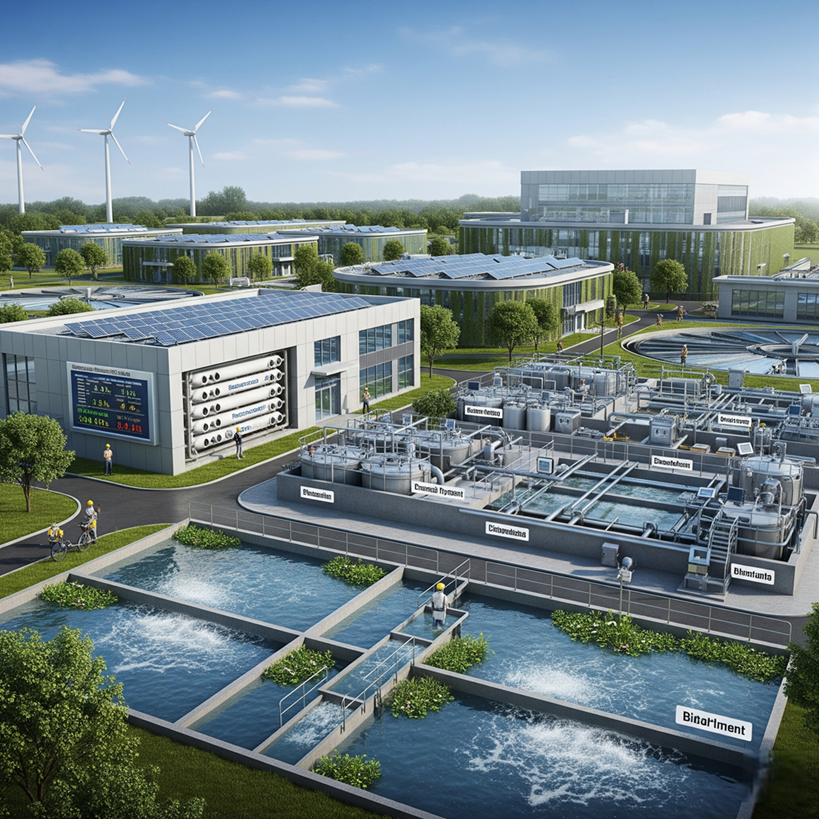
Sustainability and Water Security: Pillars of the Industrial Water Sector in KSA
Water has long been considered a precious resource in the Kingdom of Saudi Arabia. Today, industrial water treatment has transformed from a challenge into a golden opportunity for achieving sustainability and economic growth, in line with the ambitions of Vision 2030. It is a process that not only protects the environment. But also serves as a catalyst for operational efficiency. It helps reuse water, reduce costs, and enhance the reliability of industrial equipment, cementing the Kingdom’s position as a leader in sustainable development.
Water and wastewater treatment in the Saudi industrial sector is an essential and indispensable element in achieving water security and environmental sustainability, a key pillar of Saudi Vision 2030. The benefits of treatment are not limited to environmental protection but also extend to enhancing economic efficiency and extending equipment life by preventing corrosion and sedimentation, which reduces maintenance costs and increases operational reliability in large industrial facilities.
Moreover, the importance of treatment goes beyond direct operational benefits. It is fully aligned with national sustainability goals. Supported by the ambitious vision, Saudi industries are adopting wastewater reclamation and reuse practices on a large scale to reduce environmental impacts, manage water as a valuable strategic resource, and directly contribute to sustainable development and water security efforts.
Read also: Why Water Treatment is Important in the Industrial Sector
Regulatory and National Framework in the Kingdom
An Overview of Local Regulations
In Saudi Arabia, regulatory frameworks for industrial wastewater treatment and water resource management are being carefully developed. This is driven by the country’s water challenges and the importance of preserving this vital resource. Leading this effort is the National Center for Environmental Compliance (NCEC), which sets environmental standards and requirements that industrial facilities must comply with, including limits on pollutant concentrations allowed to be discharged.
The National Water Strategy, launched by the Kingdom, also serves as a comprehensive roadmap for water resource management. It aims to improve the quality of water services, ensure the sustainability of resources, rationalize consumption, and increase the reuse of treated water to more than 50% by 2030. In addition, the Saudi Water Partnership Company (SWPC) plays a pivotal role in developing water sector infrastructure, including treatment and reuse projects.
The Role of Compliance Specialists in Saudi Arabia
In this context, environmental compliance specialists in the Saudi industrial sector play a vital role. They are responsible for developing internal compliance programs, conducting periodic audits, and ensuring that treatment facilities operate within local standards. They also maintain ongoing communication with the National Center for Environmental Compliance (NCEC) and relevant authorities to stay abreast of any regulatory updates. This enables them to adapt their operations accordingly and avoid costly violations.
Costs of Non-Compliance
Failure to comply with Saudi regulations can result in severe financial and operational consequences. The National Center for Environmental Compliance can impose hefty fines, which can reach millions of riyals. This can also lead to the suspension of industrial licenses or even the closure of facilities in cases of serious and repeated violations. This, in turn, damages business reputation and threatens the continuity of operations, especially given the Kingdom’s relentless pursuit of high environmental standards.
Technological Developments and Innovation Opportunities in Saudi Arabia
Industrial water treatment technologies in the Kingdom have witnessed remarkable development, supported by massive investments in research and development and international partnerships. These technologies include:
- Membrane and Desalination Technologies: The Kingdom is a global leader in desalination. These technologies (such as reverse osmosis) have been adapted to effectively treat industrial wastewater. Allowing it to be reused for cooling or indirect irrigation purposes.
- Integrated Treatments: These combine chemical, physical (such as sedimentation and pH adjustment), and biological (using bacteria to degrade organic contaminants) treatments to achieve maximum efficiency.
- Innovative Solutions: Advanced solutions such as membrane bioreactors (MBRs) and recovery and recirculation systems have emerged. These not only improve water quality but also contribute to reducing energy consumption and the carbon footprint of the industrial sector, a key national goal.
Related Article: Advanced Technologies for Mining Water Treatment
Case Studies and the Saudi Context
- Jubail Industrial City: A leading global model for integrated environmental management. It relies on a complex network to collect and treat industrial wastewater from various factories. This wastewater is then safely reused to irrigate the city’s vast green spaces, contributing to reducing pressure on freshwater resources.
- Riyadh Wastewater Project: Aims to treat most of the capital’s wastewater and expand its reuse. This supports the goals of the National Water Strategy and reduces waste.
- Independent Energy Resources (Water & Electricity Company): The company treats produced water associated with oil extraction and reuses it in injection processes to enhance recovery. This achieves resource efficiency and reduces environmental impact.
Lessons Learned and Future Directions
Successful Saudi models demonstrate that a proactive approach and collaboration between the public and private sectors are key to success. Industries should:
- Invest in modern technologies that save water and energy.
- Build partnerships with local and international technology providers and research institutions.
- Focus on continuous innovation in water and energy management practices.
- Environmental compliance: Periodic audits are conducted to improve performance and ensure ongoing alignment with national objectives.
In short, industrial water treatment in Saudi Arabia is no longer just a commitment; it is a strategic investment in sustainability, operational efficiency, and the future. It represents a golden opportunity for industries to directly contribute to achieving the Kingdom’s ambitious Vision 2030.
Investments and Partnerships: Pillars of Innovation in the Sector
As part of the Kingdom’s pursuit of sustainability goals, its role has not only been limited to establishing regulatory frameworks but has also extended to include pumping massive investments into water infrastructure projects and encouraging public-private partnerships. The Saudi Water and Electricity Company (SWPC) is working to launch major wastewater treatment and reuse projects, opening the door for local and international private sector companies to participate in this promising market. These partnerships not only provide financing and technical expertise. But also contribute to building local capabilities capable of managing and operating these projects with high efficiency.
The Kingdom is an attractive environment for investment in advanced water technologies, with startups and research institutions seeking to develop innovative solutions specifically designed to address the region’s water challenges. For example, the focus is on research and development of decentralized treatment systems that can be installed in remote areas or small industrial facilities, reducing the need for costly sewage networks. Renewable energy solutions, such as solar power, are also being developed to operate treatment plants, contributing to lower operating costs and reducing the sector’s carbon footprint.
These investments and partnerships are a cornerstone of achieving the ambitious goals of the National Water Strategy. Through collaboration between government agencies, investors, and technology providers, the pace of innovation can be accelerated and the latest solutions implemented, ensuring that every drop of water treated today contributes to building a prosperous and sustainable economic future for generations to come. This proactive approach reflects the Kingdom’s unwavering commitment to transforming its water challenges into global success stories, strengthening its position as a hub for innovation and development.

























